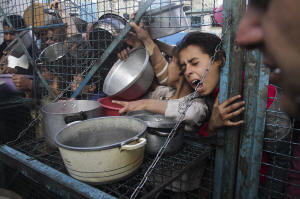|
In the north, Israel has continued its siege on Beit Lahiya,
Beit Hanoun and Jabaliya with Palestinians living there largely
denied aid, the U.N. Office for the Coordination of Humanitarian
Affairs, known as OCHA, said. Recently, it said, about 5,500
people were forcibly displaced from three schools in Beit Lahiya
to Gaza City.
Adding to the food crisis, only four U.N.-supported bakeries are
operating throughout the Gaza Strip, all of them in Gaza City,
OCHA said.
Sigrid Kaag, the senior U.N. humanitarian and reconstruction
coordinator for Gaza, told reporters after briefing the U.N.
Security Council behind closed doors Tuesday afternoon that
civilians trying to survive in Gaza face an “utterly devastating
situation.”
She pointed to the breakdown in law and order and looting that
has exacerbated a very dire situation and left the U.N. and many
aid organizations unable to deliver food and other humanitarian
essentials to hundreds of thousands of Palestinians in need.
Kaag said she and other U.N. officials keep repeatedly asking
Israel for access for convoys to north Gaza and elsewhere, to
allow in commercial goods, to reopen the Rafah crossing from
Egypt in the south, and to approve dual-use items.
Israel’s U.N. Mission said it had no comment on Kaag’s remarks.
The U.N. has established the logistics for an operation across
Gaza, she said, but there is no substitute for political will
that humanitarians don’t possess.
“Member states possess it,” Kaag said. And this is what she
urged Security Council members and keeps urging the broader
international community to press for — the political will to
address Gaza’s worsening humanitarian crisis.
All contents © copyright 2024 Associated Press. All rights
reserved |
|




